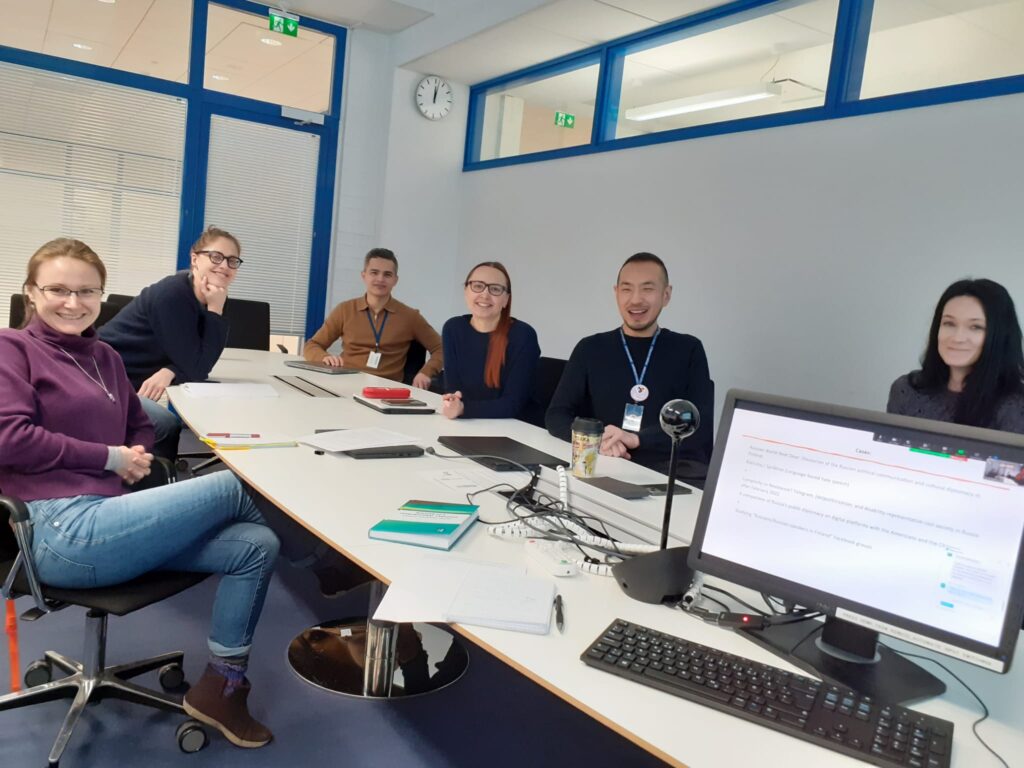In collaboration with scholars from the recently launched project ‘Everyday Affective Practices Online: Producing, Experiencing, and Managing Hate Speech in the Digital Era’, our team organised a workshop to foster dialogue on shared research interests, challenges, and potential solutions This gathering included team members as well as individual researchers focusing on Russian-speaking communities – Dr Ilkhom Khalimzoda, Dr Francesca Chiarvesio and Doctoral researcher Han Yue – and created a dynamic forum for the exchange of ideas and expertise from a variety of ongoing and newly initiated research efforts.

The discussion began with an acknowledgement of the changing research landscape following Russia’s invasion of Ukraine in 2022. Tatiana Romashko introduced the initial aims and research focus of the ‘Russian Next Door Project’, followed by Rasa Zakeviciute’s insights into the necessary adjustments to research methodology, data collection and analysis. A recurring theme in our project was the reluctance of people to participate in research. Ilkhom shared his experience of adapting the methodology and data scope of his PhD study due to low response rates from Russian-speaking groups in Finland and Latvia. He also recounted encounters with discrimination and scepticism from Russian speakers who were uncomfortable with being subjects of research and questioned his cultural and linguistic affiliations. At the same time, this sentiment reflects a wider reluctance among Russians to be studied by their compatriots, as others have suggested.
Dr Vera Zvereva discussed the challenges and innovative strategies for researching Russia’s information warfare in Finland. Vera raised the topic of new socio-political settings, in which the Russian-speaking population becomes targeted by both Russian authorities and Finnish politicians. Vera’s media analysis indicated that Russian-language Telegram and Facebook groups have been besieged by Russian trolls, since the last year. Trolls’ narratives are designed to increase political and social polarisation within these communities. It is complicated by the lack of moderation in these groups. Quite often people’s complaints about inappropriate content rarely led to action against the trolls or their messages.
The workshop addressed the ethical dilemmas of researching closed social media groups, given that EU legislation requires the consent of the group’s moderator for research activities. This raises questions about how to proceed when moderators are unresponsive or absent. Another issue of concern was the analysis of troll-fuelled discourse. Vera cautioned against generalising the antagonistic and xenophobic rhetoric of the Telegram or Facebook groups to the wider Russian-speaking population in Finland.

A significant portion of the workshop was dedicated to the emotional toll on researchers working in the field of hate speech, with Ilkhom and Francesca sharing their experiences of conducting interviews with Russian speakers both abroad and in Russia. This reflection highlighted the complexities and personal challenges faced by researchers in navigating sensitive issues and engaging with affected communities.
Dr Evgenia Amey presented the newly launched project on hate speech against Russian and Swedish speakers in Finland. The project explores language hate by analysing the stigmatising discourse targeting the speakers’ languages and its impact on social media. We discussed possible ways of cooperation and information exchange. In summary, the workshop enabled researchers from different fields of expertise to negotiate current ethical considerations, methodological adaptability to the changing context, and the need for resilience among researchers navigating the complexities of studying hate speech and digital discourse in politically charged environments.
